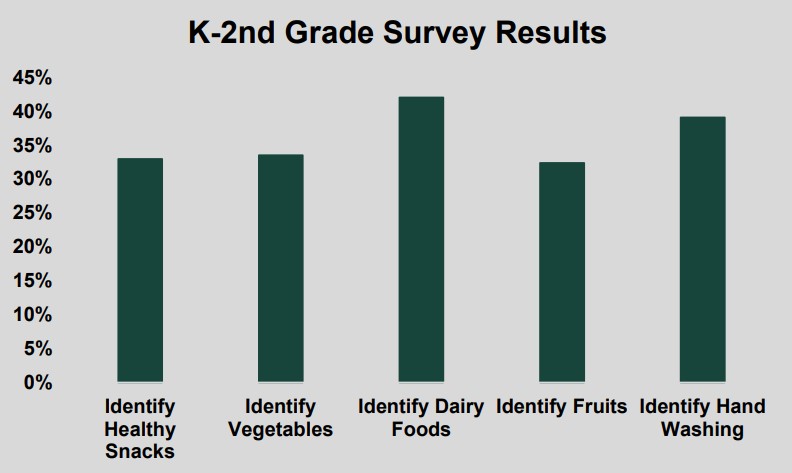
MSU Extension in the Detroit Public Schools Community District: A Unified Approach to Youth Health and Wellness
DOWNLOADMarch 9, 2023 - Michigan State University Extension
Michigan State University (MSU) Extension delivers affordable, relevant, evidence-based education to help adults, young people, and families in urban and rural communities be healthy. Programs focus on helping participants gain the skills they need to buy and prepare nutritious, budget-friendly foods; increase their physical activity; breastfeed their babies; and stretch their food dollars.
Throughout the state, community nutrition instructors (CNI’s) deliver comprehensive, evidence-based programming to SNAP-Ed and EFNEP-eligible participants in their communities. These programs include face-to-face classroom instruction, one-time health presentations or demonstrations, and initiatives that improve the policy, system, or environmental factors of an organization, worksite, or school.
Recent data show that Detroit children live in more poverty compared to the national average, which is associated with lower food expenditures, low fruit and vegetable consumption, and lower-quality diets. Research has shown that improving these behaviors among students can have a strong, positive effect on overall health, improve cognition and tests scores, and improve overall quality of life.
The overall mission of Michigan State University Extension is to help people improve their lives through an educational process that applies knowledge to critical issues, needs and opportunities. MSU Extension provides education and resources directly to individuals and communities throughout the state of Michigan to help and empower our communities raise healthy and safe families.
 Over the past 17 years, MSU Extension has provided education and resources to over 30 schools throughout the city of Detroit to promote healthy nutrition and physical activity-related behaviors through research and evidence-based education programs. Our community nutrition instructors (CNI’s) have worked diligently with DPSCD administrators and teachers to meet classroom needs and provide an enriching experience for youth development. Our staff are trained in evidence and best-practice approaches to providing instruction and examples to a variety of audiences, including children, adults, seniors, those with cognitive and physical disabilities, and many more.
Over the past 17 years, MSU Extension has provided education and resources to over 30 schools throughout the city of Detroit to promote healthy nutrition and physical activity-related behaviors through research and evidence-based education programs. Our community nutrition instructors (CNI’s) have worked diligently with DPSCD administrators and teachers to meet classroom needs and provide an enriching experience for youth development. Our staff are trained in evidence and best-practice approaches to providing instruction and examples to a variety of audiences, including children, adults, seniors, those with cognitive and physical disabilities, and many more.
Participant Demographics
- 1,115 Total Participants
- Gender:
- Female: 554
- Male: 561
- Race:
- 82% Black or African American
- 14% Caucasian
- 4% Unknown/Prefer not to respond
- Ethnicity:
- 82% Non-Hispanic or Latino
- 15% Hispanic or Latino
- 3% Unknown
Below is a summary of SNAP-Ed and EFNEP nutrition education programming in Detroit Public Schools Community District from October 2021 to May 2022. Students who participated in our programming completed an age-appropriate pre-survey before the program and a post-survey upon completion. Students in kindergarten through 2nd grade were assessed using either a Teacher Observation Form or a brief pictorial survey asking students to identify healthy foods and healthy behaviors given a set of choices. Only participants who completed both surveys are included in the following outcomes and are denoted as (n = X); missing data for each item was excluded casewise.
SNAP-Ed youth
- 29% Increased vegetable consumption (n=91)
- 26% Used nutrition labels more often (n=91)
- 23% Increased fruit consumption (n=91)
- 22% Reduced sugary beverage consumption (n=91)
K-2nd Grade Teacher Observation Form
Teachers observed the following improvements in their student’s healthy behaviors:
- 89% of teachers observed more handwashing behaviors
- 100% of teachers observed students being more physically active
- 100% of teachers observed their students eating more fruits and vegetables
Physical activity
- 26% Improved physical activity participation (n=86)
- 9% Reduced their screen time habits (n=91)
Food safety
- 13% Wash their hands more often (n=91)
- 31% Put cold foods back in the refrigerator more often (n=90)
EFNEP Youth – 3rd to 12th
- 36% Of youth ate more fruit (n=225)
- 36% Of youth ate more vegetables (n=223)
- 37% Of youth drank less sugary beverages (n=225)
- 36% Of youth were more physically active (n = 224)
- 23% Of youth put cold foods in fridge
- 25% Of youth wash hands
- 29% Of youth reduced their screen time (n = 226)
EFNEP Youth– K-2nd

Policy, systems, and environmental changes
In 2021-2022, 532 adults and youth made nutrition or physical activity changes at Bunche Preparatory Academy and Emerson Elementary-Middle School based on coaching from our staff at MSU Extension. The Healthy Choices Scorecard assessment was utilized to measure nutrition and physical activity policies, environmental and system approach opportunities.
Changes made included:
- Used visual displays to prompt healthy eating behavior choices close to the point of decision
- Used posters to prompt physical activity choices.



 Print
Print Email
Email




